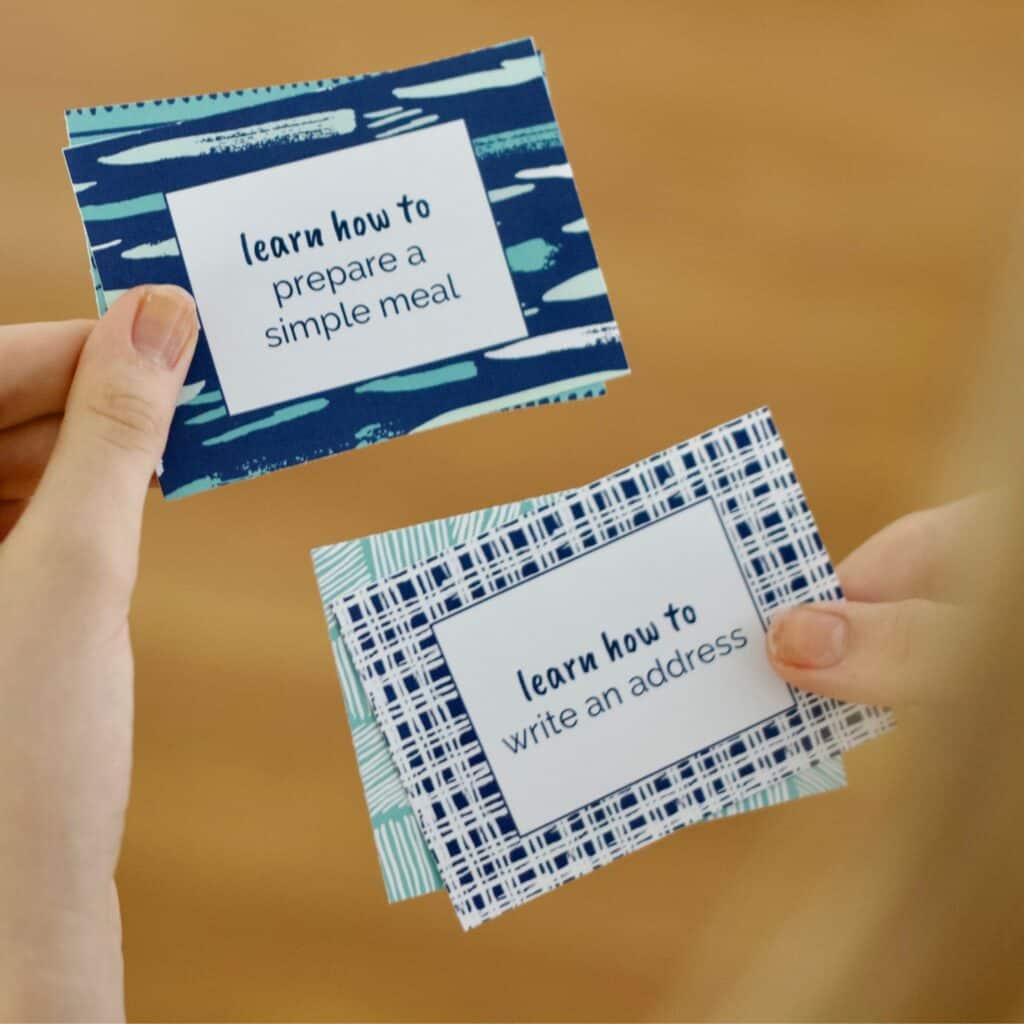How to Teach Your Kids Problem-Solving Skills and Make Parenting Easier
Strong problem-solving skills are essential for our kids to navigate the world independently. And as our children grow in their ability to problem-solve, they’ll demonstrate greater autonomy and responsibility, making parenting easier.
Problem-solving is one of nine important 21st-century skills our kids need. Click the link to see the full list.

Mom, I forgot my math homework today,” your son says shortly after coming home from school.
Your stomach sinks because, unfortunately, this isn’t the first time he’s left homework at home – and his grades are starting to reflect this habit.
Given your son’s lack of organization and lack of cleanliness in his room, it’s not surprising that his homework was misplaced in the shuffle. You’ve talked to him a number of times about the benefits of a tidy room to no avail.
So it’s frustrating to once again see the natural consequence of his disorganization – and more than tempting to point out that if he was better organized this wouldn’t happen.
But you also recognize there’s an opportunity in this challenge. A chance to help your son practice his problem-solving skills and grow independently to find possible solutions.
Daily challenges are opportunities for teaching kids problem-solving skills
Nearly every day our children present challenges to us that need a solution.
Whether it’s living in a messy and disorganized room, forgetting to pack sports clothes the night before practice, or eating chocolate on your white couch and leaving stains, you’re almost always facing a challenge.
For most parents, the natural reaction to these issues is frustration, irritation, and general disappointment. Especially if we’ve repeatedly reminded our kids to clean their rooms, pack their sports clothes the night before, and to never eat chocolate in the living room.
But if we take a step back and consider what’s really happening when our children face these challenges (or create them) we can not only take advantage of an opportunity to help them learn, but also gradually make it easier to parent them.
Here’s why: the more we teach our kids problem-solving skills to find potential solutions to their challenges, the more we’re setting them up for greater self-sufficiency. With practice, our kids can begin to use critical thinking to solve their problems independently.
And at the same time, as we eschew negative consequences or punishment and instead focus on teaching and solutions in our discipline, we avoid arguments and power struggles with our kids.
Parenting mindsets that get in the way of teaching kids to problem solve
But before diving into how to encourage our kids to problem solve, it’s important to point out that our culture and society is ripe with mindsets that would have us do otherwise.
One of the most common parenting mindsets is that children must “pay,” or rather, be punished, for their mistakes or wrongdoing. The thinking is that parents shouldn’t let children “get away” with bad behavior and kids will only learn if they’re made to suffer.
It can be especially tempting to take on this mindset when children have done something that we’ve told them endless times not to do, like eat chocolate on our white couch. Or their behavior has triggered a heightened sense of annoyance or frustration in us such as creating a mess or arguing with a sibling.
Making children “pay” for their wrongdoing, or in other words suffer, is punishment. And research shows that punishment not only doesn’t teach kids better behavior it can also exacerbate the behavior by making kids feel bad or revengeful.
One other mindset that keeps modern-day parents from encouraging kids to problem solve is the belief that children are incapable of coming up with solutions on their own.
But history and even other cultures prove that children are very capable of coming up with their own solutions. And the more we encourage kids to think for themselves, the better they’ll be at problem solving independently.
Ready to teach your child life skills? These cards can help! Each card in this eighty-one deck contains a skill your child can begin practicing with you or on their own. Click here or the image below to learn more.
Encouraging our kids to think for themselves
As mature adults who have a long history of experience problem-solving, we can be tempted to tell our kids the solution to their challenge or problem:
- “If you’d done your laundry over the weekend, your favorite green shirt would be clean for picture day.”
- “You should have packed your lunch the night before so you wouldn’t miss the bus.”
- “How many times have I told you that leaving dirty shoes on in the house results in stains on the carpet?”
The problem with providing kids, and especially teens, with a solution is it can come across as demeaning since most kids don’t like to think of themselves as irresponsible (even if realistically they are).
A more empowering and respectful way to address challenges – and also teach problem-solving skills – is to ask our kids questions. When children are asked to come up with solutions on their own, they’re practicing valuable problem-solving skills they’ll need throughout their lives.
The questions we ask should be delivered with respect and without shame. They should also carry a tone that communicates we believe our kids are capable of solving their own problems.
Examples of problem-solving questions we can ask our kids:
- What could you do differently from now on so your book doesn’t go missing?
- How could you ensure you don’t leave your homework at home again?
- What do you think is the best way to remind yourself to bring your dishes up to the sink when you’re done eating?
- Whoops! What do you need to do with the spilled apple juice?
- What could you do to make sure you’re able to get out of bed in time to get ready for school?
- What’s a good strategy for making sure art supplies get put away in the playroom when you’re done using them?
- What could you do next time to make sure you’re able to get home before our agreed-upon 11 PM curfew?
- What’s your plan for making sure your bedroom is neat and organized before the first day of school?
- It’s unfortunate you forgot to wash your soccer jersey in time for the game. How could you avoid that next time?
The importance of a cooling-off period before problem-solving
Let’s be realistic for a minute. Even if we have the best intentions of encouraging our kids to problem solve, in the moment we can often feel incapable of calmly and respectfully asking our kids questions. Especially when we’ve discovered they’ve forgotten homework multiple times in a row, damaged furniture, or missed a curfew, for example.
In these high-emotion moments, the best thing we can do is to first have a cooling-off period. After calming down and regaining a clearer mental state, we’ll be better able to lead our kids in productive positive discipline, and get them to think through a solution.
It’s perfectly fine to tell our children we’ll discuss the challenging situation with them in a few minutes, hours, or even the next morning after we’ve calmed our emotions. And often, our child may need this cooling-off period too. Sibling fights and other frustrating experiences don’t create the optimal mindset to rationally brainstorm solutions.
Problem-solving and sibling rivalry
Sibling disputes are a perfect time to encourage kids to not only problem-solve but to practice their negotiation skills.
Say one sibling makes a mess of their shared bathroom and the other sibling is fed up. Anger and frustration builds, one sibling lashes out at the other, and chaos ensues.
Since taking sides in sibling disputes can exacerbate sibling rivalry, playing the moderator of the dispute or, if it makes sense, asking kids to come to a solution on their own not only leads to a more successful outcome but also teaches life lessons. That said, most sibling disputes, especially if they’re heated, will need a cooling-off period before a rational discussion can occur.
Preparing our kids for life
Having the ability to think through solutions to challenges is one of the most important life skills we can teach our kids as we prepare them for life outside of our home. And truthfully, there’s no better place for kids to test their problem-solving skills than in the safety of their family.
If we can keep our long-term goal in mind of preparing our kids for life – and not lose our cool along the way (however difficult that may be!) – our kids will gradually learn and grow from our encouragement. Meanwhile, as our children become better problem solvers, they’ll become more self-reliant and be better equipped to avoid challenges altogether – resulting in a happier home and more confident kids.
See related:
How to Stop Doing Everything for Your Kids and Teach Responsibility
Why Consequences Aren’t Working to Change Your Child’s Misbehavior (and What Will)
Everything You Need to Know to Run a Successful Family Meeting
What to do next…
1. Subscribe to Self-Sufficient Kids’ email list.
Like what you read here and want to learn more? Every Thursday I’ll send you one parenting tip about raising self-sufficient kids and creating the peaceful relationship you yearn to have with your child. Click here to sign up.
2. Take one of my quizzes!
Find out if you’re raising a self-sufficient kid (click here) or if you’re doing too much for your kids (click here). At the end of each quiz, you’ll be asked to provide your email address to see the results.
3. Get your kids started on chores.
Learn how to get your child started on chores (& keep them motivated + avoid power struggles) by enrolling in my Get Your Kids Successfully Started on Chores course. Click here to learn more and sign up.

About Kerry Flatley
Hi! I’m Kerry, the mother of two girls and a certified parent educator. I believe it is possible for parents to have a supportive, loving, and warm relationship with their kids while raising them to be independent and ultimately self-sufficient. Over the years, I’ve read numerous books and articles that support this belief and I’ve put these ideas into practice with my own kids. Read more about me and Self-Sufficient Kids here.



